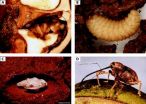(Press-News.org) CAMBRIDGE, Mass. -- MIT neuroscientists have shown that an enzyme overproduced in the brains of Alzheimer's patients creates a blockade that shuts off genes necessary to form new memories. Furthermore, by inhibiting that enzyme in mice, the researchers were able to reverse Alzheimer's symptoms.
The finding suggests that drugs targeting the enzyme, known as HDAC2, could be a promising new approach to treating the disease, which affects 5.4 million Americans. The number of Alzheimer's victims worldwide is expected to double every 20 years, and President Barack Obama recently set a target date of 2025 to find an effective treatment.
Li-Huei Tsai, leader of the research team, says that HDAC2 inhibitors could help achieve that goal, though it would likely take at least 10 years to develop and test such drugs.
"I would really strongly advocate for an active program to develop agents that can contain HDAC2 activity," says Tsai, director of the Picower Institute for Learning and Memory at MIT. "The disease is so devastating and affects so many people, so I would encourage more people to think about this."
Tsai and her colleagues report the findings in the Feb. 29 online edition of Nature. Lead author of the paper is Johannes Gräff, a postdoc at the Picower Institute.
Genome modification
Histone deacetylases (HDACs) are a family of 11 enzymes that control gene regulation by modifying histones — proteins around which DNA is spooled, forming a structure called chromatin. When HDACs alter a histone through a process called deacetylation, chromatin becomes more tightly packaged, making genes in that region less likely to be expressed.
HDAC inhibitors can reverse this effect, opening up the DNA and allowing it to be transcribed.
In previous studies, Tsai had shown that HDAC2 is a key regulator of learning and memory. In the new study, her team discovered that inhibiting HDAC2 can reverse Alzheimer's symptoms in mice.
The researchers found that in mice with Alzheimer's symptoms, HDAC2 (but not other HDACs) is overly abundant in the hippocampus, where new memories are formed. HDAC2 was most commonly found clinging to genes involved in synaptic plasticity — the brain's ability to strengthen and weaken connections between neurons in response to new information, which is critical to forming memories. In the affected mice, those genes also had much lower levels of acetylation and expression.
"It's not just one or two genes, it's a group of genes that work in concert to control different phases of memory formation," Tsai says. "With such a blockade, the brain really loses the ability to quickly respond to stimulation. You can imagine that this creates a huge problem in terms of learning and memory functions, and perhaps other cognitive functions."
The researchers then shut off HDAC2 in the hippocampi of mice with Alzheimer's symptoms, using a molecule called short hairpin RNA, which can be designed to bind to messenger RNA — the molecule that carries genetic instructions from DNA to the rest of the cell.
With HDAC2 activity reduced, histone acetylation resumed, allowing genes required for synaptic plasticity and other learning and memory processes to be expressed. In treated mice, synaptic density was greatly increased and the mice regained normal cognitive function.
"This result really advocates for the notion that if there is any agent that can selectively down-regulate HDAC2, it's going to be very beneficial," Tsai says.
The researchers also analyzed postmortem brains of Alzheimer's patients and found elevated levels of HDAC2 in the hippocampus and entorhinal cortex, which play important roles in memory storage.
Reversing the blockade
The findings may explain why drugs that clear beta-amyloid proteins from the brains of Alzheimer's patients have offered only modest, if any, improvements in clinical trials, Tsai says.
Beta-amyloid proteins are known to clump in the brains of Alzheimer's patients, interfering with a type of cell receptor needed for synaptic plasticity. The new study shows that beta amyloid also stimulates production of HDAC2, possibly initiating the blockade of learning and memory genes.
"We think that once this epigenetic blockade of gene expression is in place, clearing beta amyloid may not be sufficient to restore the active configuration of the chromatin," Tsai says.
The appeal of HDAC2 inhibitors, Tsai says, is that they could conceivably reverse symptoms even after the blockade is well-established. However, much more drug development has to take place before such a compound could enter clinical trials. "It's really hard to predict," Tsai says. "Clinical trials would probably be five years down the line. And if everything goes well, to become an approved drug would probably take at least 10 years."
Some general HDAC inhibitors, not specific to HDAC2, have been tested in clinical trials as cancer drugs. However, to treat Alzheimer's, a more selective approach is needed, Tsai says. "You want something as selective as possible, and as safe as possible," she says.
###
Written by Anne Trafton, MIT News Office
Reversing Alzheimer's gene 'blockade' can restore memory, other cognitive functions
Neuroscientists show that HDAC2 enzyme could be a good target for new drugs
2012-03-01
ELSE PRESS RELEASES FROM THIS DATE:
Why birds of a feather lek together
2012-03-01
VIDEO:
Certain kinds of male birds gather into small clusters of land called leks to perform their courtship dances, and according to science, who they choose to associate with matters....
Click here for more information.
CORAL GABLES, FL -- Certain kinds of male birds gather into small clusters of land called leks to perform their courtship dances, and according to science, who they choose to associate with matters. A new study by University of Miami Evolutionary Biologist ...
International Bestselling Author Neil Strauss Releases New Party Game with Hasbro Game Inventor Thanks to Facebook - "Who's Got Game?" is the Ultimate Party Game with 'Game!'
2012-03-01
As a journalist for Rolling Stone and The New York Times, Strauss has interviewed celebrities from Lady Gaga to Tom Cruise to Howard Stern and hundreds more. He's picked up Brittany Spears and wooed Jessica Alba on Jimmy Kimmel Live. Now he's taken all that knowledge and experience about social dynamics and packed it into the ultimate party game called "Who's Got Game?"
The Backstory: How Facebook Paved the Way for Turning the Game from a Dream into a Reality:
How did "Who's Got Game?" come to be? Through social networking, a young entrepreneur ...
Who's in the know? To a preschooler, the person doing the pointing
2012-03-01
If you want a preschooler to get the point, point. That's a lesson that can be drawn from a new study in Psychological Science, a journal published by the Association for Psychological Science. As part of their investigation of how small children know what other people know, the authors, Carolyn Palmquist and Vikram K. Jaswal of the University of Virginia, found they were able to mislead preschoolers with the simple introduction of a pointing gesture. "Children were willing to attribute knowledge to a person solely based on the gesture they used to convey the information," ...
New infant formula ingredients boost babies' immunity by feeding their gut bacteria
2012-03-01
URBANA – Adding prebiotic ingredients to infant formula helps colonize the newborn's gut with a stable population of beneficial bacteria, and probiotics enhance immunity in formula-fed infants, two University of Illinois studies report.
"The beneficial bacteria that live in a baby's intestine are all-important to an infant's health, growth, and ability to fight off infections," said Kelly Tappenden, a U of I professor of nutrition and gastrointestinal physiology. "Breast-fed babies acquire this protection naturally. Formula-fed infants get sick more easily because the ...
University of Tennessee researchers invent device to rapidly detect infectious disease
2012-03-01
Infectious diseases can spread very rapidly, so quickly identifying them can be crucial to stopping an epidemic. However, current testing for such diseases can take hours and days. But not for much longer.
Jayne Wu, associate professor of computer science and electrical engineering at the University of Tennessee, Knoxville, and Shigetoshi Eda, associate professor of Forestry, Wildlife and Fisheries at the UT Institute of Agriculture Center for Wildlife Health, have developed a portable device that can be used onsite to detect infectious diseases, pathogens as well as ...
Pecan weevil biology, management and control strategies
2012-03-01
The pecan weevil, Curculio caryae (Horn), is a major pest of pecans throughout the southeastern United States, as well as portions of Texas and Oklahoma.
In "Biology and Management of the Pecan Weevil (Coleoptera: Curculionidae)," (http://bit.ly/xrqS3d) a new article appearing in the Journal of Integrated Pest Management, scientists from Oklahoma State University and Texas A&M University describe the biology, life stages, crop injury, monitoring approaches, and primary control strategies currently used for pecan weevil in pecan.
Aimed at pecan growers extension personnel ...
Districts Combat Bullying and Violence with SafeSchools Alert - New Online System Allows Tips Via Phone, Text, Email, and Web
2012-03-01
According to a study by the United States Secret Service and Department of Education that evaluated 41 school shooters, 71% felt persecuted, bullied, threatened, attacked, or injured by others. In several cases, they had experienced school bullying and harassment that was "long-standing and severe." The study also found that most shooters planned their attack in advance and told other students of their intentions. In the Chardon High School case, reports indicate the shooter tweeted he was going to bring a gun to school.
Students often know what is happening ...
Democracy 3.0 Resolves That Self-Representation is the Mandatory Precursor to Establishing a True Democracy in America
2012-03-01
In contemplation of presidential, congressional, gubernatorial and state elections in November 2012, Robert Weidenfeld's book proposes a viable alternative to the systems of governments that grossly abused and contravened the principles of true democracy ever since 1789, when George Washington became the first President of the original 13 united colonies.
The book reviews major historical events during the last 5,000 years, including the most significant systems of laws governing various societies during this lengthy period of time. Evidence from primary sources reveals ...
NASA finds thickest parts of Arctic ice cap melting faster
2012-03-01
VIDEO:
The most visible change in the Arctic region in recent years has been the rapid decline of the perennial ice cover. The perennial ice is the portion of the sea...
Click here for more information.
GREENBELT, Md. -- A new NASA study revealed that the oldest and thickest Arctic sea ice is disappearing at a faster rate than the younger and thinner ice at the edges of the Arctic Ocean's floating ice cap.
The thicker ice, known as multi-year ice, survives through the cyclical ...
NASA satellite sees tropical cyclone Irina headed for Mozambique
2012-03-01
Visible and Infrared satellite imagery together provide a clearer picture of what a tropical cyclone is doing. NASA's Aqua satellite passed over newly strengthened Cyclone Irene and captured both types of images, which showed the extent and power of the storm.
The low pressure area called System 92S that tracked across northern Madagascar this week and brought flooding rains has moved into the Mozambique Channel, strengthen and has been renamed Irina. NASA satellites captured a visible image of Irina as it filled up the northern half of the Mozambique Channel.
System ...
LAST 30 PRESS RELEASES:
Kidney cancer study finds belzutifan plus pembrolizumab post-surgery helps patients at high risk for relapse stay cancer-free longer
Alkali cation effects in electrochemical carbon dioxide reduction
Test platforms for charging wireless cars now fit on a bench
$3 million NIH grant funds national study of Medicare Advantage’s benefit expansion into social supports
Amplified Sciences achieves CAP accreditation for cutting-edge diagnostic lab
Fred Hutch announces 12 recipients of the annual Harold M. Weintraub Graduate Student Award
Native forest litter helps rebuild soil life in post-mining landscapes
Mountain soils in arid regions may emit more greenhouse gas as climate shifts, new study finds
Pairing biochar with other soil amendments could unlock stronger gains in soil health
Why do we get a skip in our step when we’re happy? Thank dopamine
UC Irvine scientists uncover cellular mechanism behind muscle repair
Platform to map living brain noninvasively takes next big step
Stress-testing the Cascadia Subduction Zone reveals variability that could impact how earthquakes spread
We may be underestimating the true carbon cost of northern wildfires
Blood test predicts which bladder cancer patients may safely skip surgery
Kennesaw State's Vijay Anand honored as National Academy of Inventors Senior Member
Recovery from whaling reveals the role of age in Humpback reproduction
Can the canny tick help prevent disease like MS and cancer?
Newcomer children show lower rates of emergency department use for non‑urgent conditions, study finds
Cognitive and neuropsychiatric function in former American football players
From trash to climate tech: rubber gloves find new life as carbon capturers materials
A step towards needed treatments for hantaviruses in new molecular map
Boys are more motivated, while girls are more compassionate?
Study identifies opposing roles for IL6 and IL6R in long-term mortality
AI accurately spots medical disorder from privacy-conscious hand images
Transient Pauli blocking for broadband ultrafast optical switching
Political polarization can spur CO2 emissions, stymie climate action
Researchers develop new strategy for improving inverted perovskite solar cells
Yes! The role of YAP and CTGF as potential therapeutic targets for preventing severe liver disease
Pancreatic cancer may begin hiding from the immune system earlier than we thought
[Press-News.org] Reversing Alzheimer's gene 'blockade' can restore memory, other cognitive functionsNeuroscientists show that HDAC2 enzyme could be a good target for new drugs



